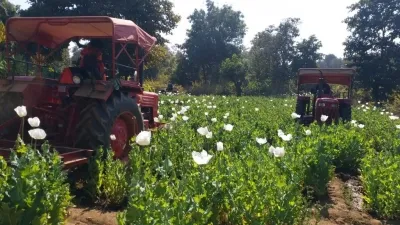How Is the Centre Supporting Farmers in Opium Poppy Cultivation?

Synopsis
Key Takeaways
- 1.21 lakh farmers eligible for opium cultivation licenses.
- 23.5% increase in licenses compared to previous year.
- Policy promotes high yields of opium and alkaloids.
- Incentives for farmers achieving high yields.
- Focus on self-reliance and quality in alkaloid production.
New Delhi, Sep 12 (NationPress) On Friday, the Union government unveiled its annual licensing policy for the Opium Crop Year, spanning from October 1, 2025, to September 30, 2026. Under this new framework, approximately 1.21 lakh farmers in Madhya Pradesh, Rajasthan, and Uttar Pradesh are now eligible to obtain licenses for opium poppy cultivation.
This marks a notable 23.5 percent increase in the number of licenses issued compared to the previous crop year, bringing an additional 15,000 farmers into the fold who stand to gain from opium cultivation this year, as stated by the Ministry of Finance.
The Central government remains committed to ensuring a sufficient supply of alkaloids to meet medical and palliative care demands. Concurrently, initiatives are in place to enhance processing capacity through self-reliant measures, aimed at fulfilling the requirements for alkaloids necessary for producing essential narcotic drugs, according to the statement.
Key aspects of the annual license policy include the retention of current opium gum cultivators who have achieved an average morphine yield (MQY-M) of 4.2 kg per hectare or higher. Additionally, existing opium gum cultivators with morphine yields between 3.0 kg and 4.2 kg per hectare can now cultivate unlanced poppy straw through the Concentrate of Poppy Straw method, valid for five years.
Moreover, the digitization of cultivators' data since 1995-96 has improved inclusivity, allowing previously marginal farmers to obtain licenses by meeting the new eligibility and relaxed criteria.
The government aims to encourage high-performing farmers, achieving yields of 900 kg/hectare or more of unlanced poppy straw, by offering them an option to revert to the traditional opium gum cultivation method. This transition is designed to enhance opium yields from their holdings while acting as a positive reinforcement mechanism to mitigate the risk of diversion from the field, as explained in the statement.
Simultaneously, licenses for the crop year 2025-26 will be suspended for farmers under CPS cultivation who did not meet the minimum qualifying yield (MQY) of 800 kg/hectare during the last crop year (2024-25).
The government is actively upgrading the capacities of its Opium and Alkaloid Factories. Significantly, this year, the Government Alkaloid Factory at Neemuch has received WHO GMP certification.
This policy strives to achieve a balance between Atmanirbharta (self-reliance) for government-regulated alkaloid units and support for Indian pharmaceutical companies in alkaloid APIs and formulations. By leveraging their technical expertise and brand credibility, the initiative aims to advance the 'Make for World' vision, as added in the statement.









